
 |
|
|
#1 |
|
Member
Join Date: Dec 2004
Location: What is still UK
Posts: 5,806
|
For all stick fighting fans, I know you are out there. I got this some years ago and put it away rather dismissively but this evening it reappeared and I see it in a new light. This is 31" long in total just too short to be a proper walking stick, that too can be used to fight with. Tanzania is one of the places in the world from where some of the finest turquoise comes. Jean-Baptiste Bacquart in his book "The Tribal Arts of Africa" mentions swagger sticks from East Africa but I think they are also fighting sticks. You can see from the pictures, the stick has not been in contact with the ground. I suspect in general the carved section is the handle but the deft of hand may be able to use each end depending on the weight of the situation. 20th century, nice Babylon!!!

|
|
|

|
|
|
#2 |
|
Member
Join Date: Jan 2006
Location: Kent
Posts: 2,653
|
Hi Tim,
I have a similar stick, in a lighter coloured wood. The carving on mine is similar, in that it portrays a kneeling young women with her arms clasp on her stomach. There is good detail in the carving of the head showing elongated ear lobes. The 'domed' head would make a useful striking area. However, I noticed that the carved end fitted nicely in the hand (hilt style) and thought perhaps it was a walking stick/wooden sword like device? Yours certainly looks older, I try and post some pics soon. |
|
|

|
|
|
#3 |
|
Member
Join Date: Jan 2006
Location: Kent
Posts: 2,653
|
Here those pictures, my version is about 6 inches longer. I wondered whether the stylised female form has a symbolic, totemic or religious significance? The colour of the wood is much closer to the first picture
|
|
|

|
|
|
#4 |
|
Member
Join Date: Dec 2004
Posts: 1,712
|
I think I have these in a book on collecting walking sticks,, Ill see if I can find it.
Spiral |
|
|

|
|
|
#5 |
|
Member
Join Date: Dec 2004
Location: What is still UK
Posts: 5,806
|
My stick is made of fairly heavy dense wood and oddly just too short to work as a walking stick. I am only 5' 8" so not tall. Sticks are important objects in Africa and stick fighting almost a continent wide sport. Another area where knowledge seems in short supply.
"Edit" The neck on this second stick looks rather too delicate to be a fighting stick. It is possible that sticks are made and carried as a shadow of former times. Last edited by Tim Simmons; 27th July 2006 at 08:14 AM. |
|
|

|
|
|
#6 |
|
Member
Join Date: Dec 2004
Posts: 1,712
|
Heres the article Tim, I Dont know how relevant it is.
Its from a pamphlet style book by Catherine Dike who apparently has written 4 other books on sticks & canes mainly in French. Spiral 
|
|
|

|
|
|
#7 | |
|
Member
Join Date: Jan 2006
Location: Kent
Posts: 2,653
|
Quote:
Spiral what an interesting book....some of those sticks have lovely carving. |
|
|
|

|
|
|
#8 |
|
Member
Join Date: Dec 2004
Location: What is still UK
Posts: 5,806
|
David, I am going to keep this short and greatly summarised so as not to get bogged down. Your stick is modern and from Nigeria and is based on a traditional Yoruba image. In old pieces the female is always naked except sometimes for a string of beads around the waist. The kneeling naked position is adopted when greeting the creator, I could provide names but would never really be 100% I was correct just now. The figure is mostly seen with her hands resting or appearing to lift her breasts which completes the gesture, which is rather quaint, do not laugh as this is seriously so. I have a modern staff that dissplays this, note the same neck on the figure. I also post some old items from Fagg, Pemberton, Holcombe Yoruba, Sculpture of west Africa. A mirror board and priests divination tapper. Short I know but pionts in the right direction.
Last edited by Tim Simmons; 27th July 2006 at 07:54 PM. |
|
|

|
|
|
#9 |
|
Member
Join Date: Jan 2006
Location: Kent
Posts: 2,653
|
Thanks Tim,
very interesting info, I appreciate your explanation. I really should source litrature concerning African symbolism and iconography, it surely is a fascinating topic. |
|
|

|
|
|
#10 |
|
Member
Join Date: Dec 2004
Location: Sint-Amandsberg (near Ghent, Belgium)
Posts: 830
|
Look what I found in the corner of my office : a stick !
 I remember purchasing this one quite some time ago. I forgot about it. According to the seller it came from Africa. Could well be a stick from Rwanda, as can be seen from Spiral's article. I wonder what the iconographic explanation of the grip of this piece is. After looking at it for some time, I can see the image of a person...? Or am I wrong ? Anyway... the total length is 112,5 cm. At the bottom, a metal spike has been added (length : 24 cm) for sticking it into the ground. For me, this stick is a bit too long to be an ordinary walking cane. I would rather call it a staff. 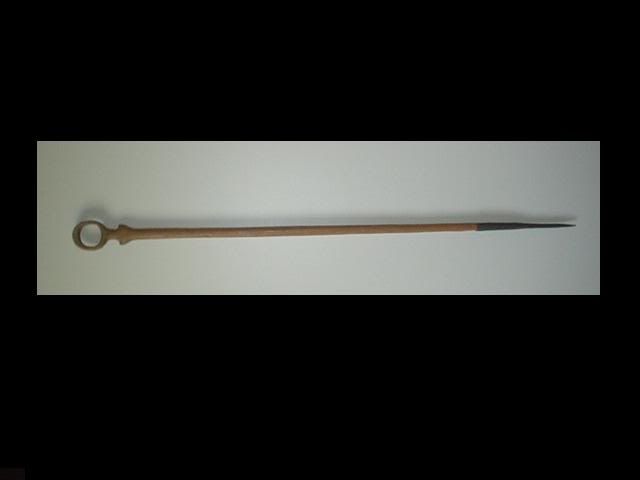 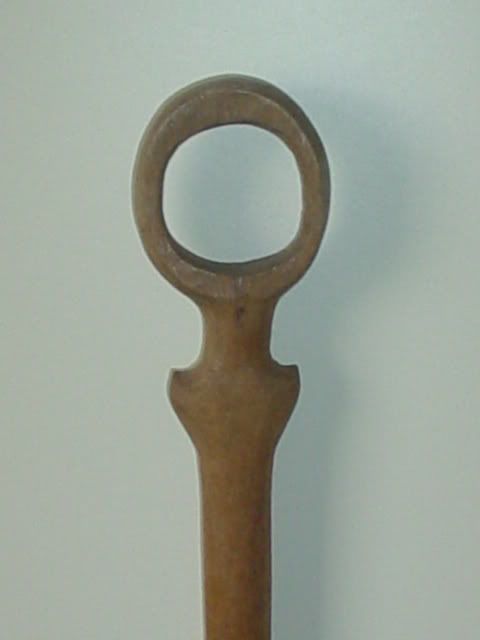 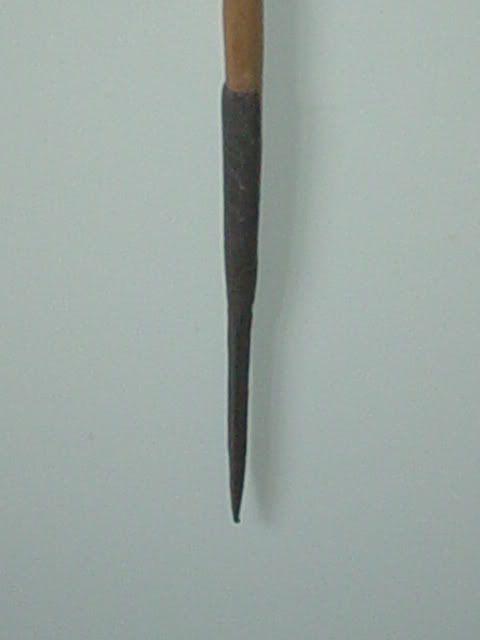
|
|
|

|
|
|
#11 |
|
Member
Join Date: Jan 2006
Location: Kent
Posts: 2,653
|
Freddy,
do you think that there is a possibilty that this is one of a pair? I,m thinking that the spike would allow it to be driven into the ground easily. If you had two, one either side of an open fire you could have a cross piece ( a branch of a tree or pole) that fitted through the holes. You could then hang a cooking pot from it........ Interesting object....would obviously make a good defensive weapon.....could even use it to pick up litter  Many ethnic items seem to have many uses........wooden 'swiss army' knife with perhaps a number of functions... |
|
|

|
|
|
#12 |
|
Member
Join Date: Dec 2004
Location: Sint-Amandsberg (near Ghent, Belgium)
Posts: 830
|
Would more be an 'African army knife', no ?
 Here's another one which I showed acquired quite some time ago in a lot of African clubs. It came from ebay and the seller was convinced these were drum sticks (that's why I got them so cheap,  ) )It's a club from the Gogo-tribe in Tansania. Here shown next to some 'ordinary' clubs. The 'body' of this club is peculiar with the swelling. And I see a monkey's head when I look at the top part. 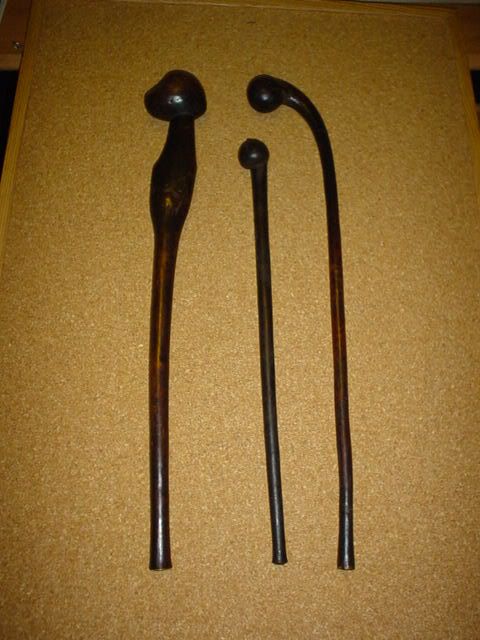 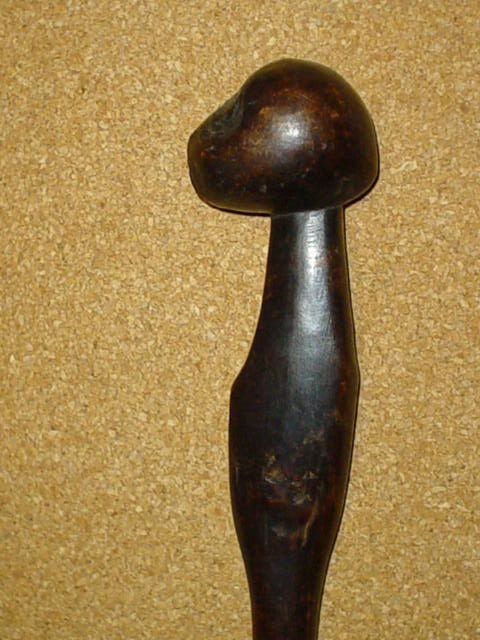 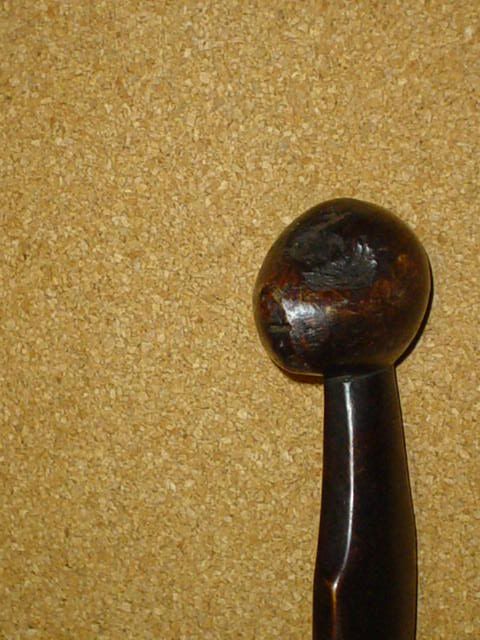
|
|
|

|
|
|
#13 |
|
Member
Join Date: Dec 2004
Location: What is still UK
Posts: 5,806
|
Freddy the spike on your stick if remarkably similar to the spike on this staff. Perhaps they are from neighbouring areas of central Africa/Congo.
|
|
|

|
|
|
#14 |
|
Member
Join Date: Dec 2004
Location: What is still UK
Posts: 5,806
|
I have been looking at the stick I started the thread with through a x10 loop. I have a feeling it is made from a horn. That would be a rather long horn. Can one test for horn? I will try get a picture of the structure.
|
|
|

|
|
|
#15 |
|
Member
Join Date: Dec 2004
Location: Sint-Amandsberg (near Ghent, Belgium)
Posts: 830
|
I have already seen a 'rungu' - that's the name of the club used by the Maasai - which was made of horn. By this, I mean rhino-horn.
It was a real beauty, but nothing I could afford 
|
|
|

|
|
|
#16 |
|
Member
Join Date: Dec 2004
Location: What is still UK
Posts: 5,806
|
Rhino horn?
  
|
|
|

|
|
|
#17 |
|
Member
Join Date: Dec 2004
Location: What is still UK
Posts: 5,806
|
This is quite interesting. Presumably turned on bodger type spring lathe?
http://southernsudan.prm.ox.ac.uk/de...908.26.5_d.jpg I cannot get the link to work  Google- Burun cup, to see. It is working now  Thank you if somebody work the magic. Thank you if somebody work the magic.
Last edited by Tim Simmons; 6th August 2006 at 05:13 PM. |
|
|

|
|
|
#18 |
|
Member
Join Date: Dec 2004
Location: What is still UK
Posts: 5,806
|
One thing is a little curious about the carving of the figure on this stick, is that the left hand has 6 fingers. People having 6 fingers on a hand is not that unusual. Even if this stick came from people without specialist carvers I find it curious that such a basic element of humans is portrayed so.
Bearing in mind this may well be rhinoceros horn, a prestige material. I wonder if the sixth finger is deliberate. In a small community this would be unusual. A sixth finger has at times been seen as a noble sign. I believe it runs in some royal households in history for various reasons. Anne Boleyn is said to have had 6 fingers on a hand but then she did loose her head. What do you think? It just seems a little odd to me. |
|
|

|
|
|
#19 |
|
Member
Join Date: Jan 2006
Location: Kent
Posts: 2,653
|
Hi Tim, all the info I have is pretty generalised, did a bit of checking...but discovered little......
Polydactyls have six or more digits on their hands or feet. The extra digits vary from small pieces of soft tissue to apparently complete digits. Historically and in the contemporary world, polydactylyism has been associated with witchcraft, psychic power, the extraterrestrial, divine connection, and sporting prowess. Also there numerous works of art from many era’s and cultures, that depict diety’s with 6 fingers The Number 6 also has connections with belief and mythology. For Christians, Jews and Moslems, the number 6 represents the day that man was created. Mathematicians revere the number 6 because it is the first perfect number. Deities associated with the number 6 include Athena, the Greek Goddess of Wisdom; Bacchus, the Roman God of Wine and Hermes, the Greek God of Communication |
|
|

|
|
|
#20 |
|
Member
Join Date: Dec 2004
Location: What is still UK
Posts: 5,806
|
David that is very interesting. I do wonder if you have really brought something to the discussion. The Burun cup link, is all about the magic quality of Rhinoceros horn. Perhaps this is more of a staff, one could deliver a jolly good whack to protect yourself if need be. Anyhow I now think that the carving is deliberate. Thanks for information. Something to take to the next Halloween party
 . .
|
|
|

|
|
|
#21 |
|
Member
Join Date: Jan 2006
Location: Kent
Posts: 2,653
|
Tim, regarding the Barum cup.....the belief that Rhino horn neutralised poisons was also prevalent in Asia and Europe and there are numerous examples of similar cups.....which I found surprising.
The mystical powers of Rhino horn are mainly concerning increased sexual power and longevity. With the combination of the carved female form and the phallic symbolism of the staff, suggests a fertilty or a 'right of passage' ritualistic device. Perhaps the 6 fingered hand is symbolic of the female connection to a diety (creator ?), the bringer of life? It is also possible that the 6 fingered hand is a direct representation of an individual. In tight knit communities genetic anomolies would be 'consentrated' in a localised area, if this was the case, perhaps it is a form of tribal/community identity. |
|
|

|
|
|
#22 |
|
Member
Join Date: Dec 2004
Location: What is still UK
Posts: 5,806
|
I think this is most probably the case, a protective talisman. I think I am rather lucky to have it in my care for my life time. It goes with my Baron Samedi costume.

|
|
|

|
|
|
#23 |
|
Member
Join Date: Jan 2006
Location: Kent
Posts: 2,653
|
THE THINGS VOO DO.....
 
|
|
|

|
|
|
#24 |
|
Member
Join Date: Jun 2006
Location: On the banks of Cut Bank Creek, Montana
Posts: 189
|
Is that Rhino horn? If it is it came from an exceptional rhino. Black rhino horn averages 12 to 32 inches. White rhino averages 24 inches although the record is 5" 3".
|
|
|

|
|
|
#25 |
|
Member
Join Date: Dec 2004
Location: What is still UK
Posts: 5,806
|
Hello Douglas,
I am inclined to think it is. It has taken me some time to realise. At 31" it came from a big animal. The patina would suggest very early 20th century. In places there must still have been some big ones around. |
|
|

|
|
|
#26 |
|
Member
Join Date: Jun 2006
Location: On the banks of Cut Bank Creek, Montana
Posts: 189
|
Early 20th Century there were still some awesome animals around.
|
|
|

|
|
|
#27 |
|
Member
Join Date: Dec 2004
Location: What is still UK
Posts: 5,806
|
Something very similar. Only clearly in wood and Zande which is border line central Africa and east Africa.
http://southernsudan.prm.ox.ac.uk/details/1928.67.4/ |
|
|

|
 |
|
|